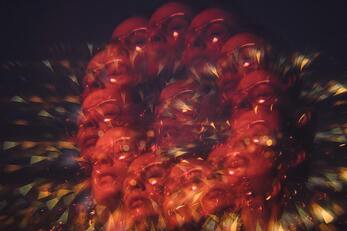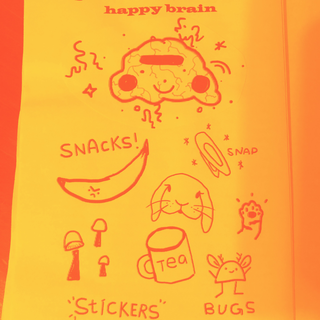|
by Julianna Holshue  via Unsplash via Unsplash Ever since I can remember, I have always wanted to write, but never had the focus for a novel. I could write poetry, short stories, jokes, and rhymes, but my heart was never set on in-depth world-building, drawn out character development, or well-planned plot arcs. No, my mind thrives better when I create the transient, even the changeable, as I am prone to distraction and grow restless from dealing with the same pieces of a story for too long. This same approach applies to my illustrations, which I have recently taken up. I sketch what I write about, which includes anthropomorphized creatures, ill-proportioned characters, untamed fauna, and bubble lettered dialogue. My illustration style lends itself more to the pages of a choose-your-own-adventure book rather than the deliberate order of the adorned walls of an art gallery, which works for me, since I do not plan on making a living as a novelist or classically trained artist.  Final page of my zine, "Torture In Your Brain" Final page of my zine, "Torture In Your Brain" I have always wondered what would happen if I combined my impromptu writings and drawings, or what genre or medium this amalgamation of creations from a dreamy, largely unorganized mind would fit into. I found my answer when I was introduced to the zine and its scatterbrained community of zinesters in a class called Self-Publishing taught by Dr. Jason Luther. I felt I belonged in this community as someone who indulges in the unexpected, random, and fluid process of creation. Zinesters, like me, are scatterbrains, and perhaps to your surprise, this method of creative functioning works to our advantage because of how experimental and open the zine medium is. When I started researching, reading, and even making zines, I found that the unspoken expectation of tentative external and internal forms matched my loose, expressive creative process quite well. This realization further solidified my opinion that zines are the ideal medium for those who work more off the cuff than with a plan; disorganization can be a gateway to experimentation because if you strictly follow a plan, you cut yourself off from thinking outside of the box, which is at the heart of zine making. By further observing the zine medium, it became obvious to me that artistic expression in all forms is encouraged given its inclusive nature. And in a community where the avant-garde is welcomed, the external and internal forms of zines can vary from conventional formats like collages, mixed media, photography, comics, illustrations, collections, poetry, prose, to completely new formats. The value of diversity exhibited by this community supports the concept that disorganized people flourish in this medium as diversions from order, conventions, and focus are embraced in zine making where anything goes.  via Unsplash via Unsplash When making a zine, you do not have to follow a rubric, structure, or organizational pattern. You are free to not only choose what you create, but how you create it, which I find is an artistic situation many scatterbrains like myself are grateful for. The patchy and changeable brainstorming process for zine making differs significantly from the more formal process of novel writing. When crafting a novel, you must plan a cohesive trajectory for your plot and characters so as to not get lost in focus or stray from convention. But, in a mindset attuned for zine making, there is no plan. Ideas smash around, bounce off each other, fuse together, and some just plain disappear into the deep pockets of forgetfulness, and that is okay because this is all part of the creative process of zine making. Zine making is also inherently more emotional than logical given its tentative approach, which caters to a mind that succeeds in a less constrictive environment free from judgment. Dwelling Place Community Building, an organization in Grand Rapids, Michigan, describes zines as “a voice for the untried ideas that come from creating without a sense of stigma against the outcome,” and so without the expectation of adhering to rules and conventions, the zinester is free to explore uncharted waters. Therefore, I believe many zinesters favor intuitive subjects over cerebral ones because these subjects fit the medium as their expressions are typically more free-flowing and vulnerable than structured and conventional. Speaking of the emotional, much of what zinesters write about are their personal obsessions according to Dr. Luther. In my opinion, what we obsess about is intuitive meaning our obsessions are not easily guided by logic as they occur naturally without choice or direction. I believe since obsessions are intuitive, it makes sense that zinesters obsess over sharing their obsessions and do so through experimentation in their zines. The zinester, JoLee Kirkikis, puts the emotional and experimental spirit of zine making beautifully when they state: It is important to let go of the notions that everything has to be perfectly complete and according to the idea you initially set out to do…Art is an organic thing and should be approached and accepted without limits by the creator. I think being possessive of your vision is a way of suppressing parts of yourself or your art that still deserve a change to considered, even if it is not part of the final outcome.  via Unsplash via Unsplash In this vein, to strictly plan a zine is in fact to detract from the strengths of this medium and doing so is damaging to your creative process. Zine making requires an unfiltered outpouring of emotions which can only happen when there is no plan. Do not be discouraged if the first thing you try does not work out because in this medium, the more you experiment, the more dazzling the finished product will be. You must dare to take risks. All in all, zines do not require strict organization, but instead require creativity, innovation, and just a little bit of a scattered mind to get the most out of this experimental craft. Zine Resources: https://www.jasonluther.net/zines/ - Dr. Jason Luther’s website. Antiquated Future’s website - an online zine distro in Portland, Oregon. Quimby’s Bookstore - a popular zine distro located in Chicago, Illinois.
0 Comments
Leave a Reply. |
Archives
July 2024
Categories
All
|
|
Glassworks is a publication of Rowan University's Master of Arts in Writing 260 Victoria Street • Glassboro, New Jersey 08028 [email protected] |
All Content on this Site (c) 2024 Glassworks
|


 RSS Feed
RSS Feed
